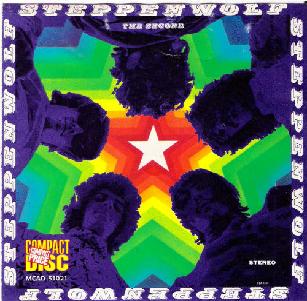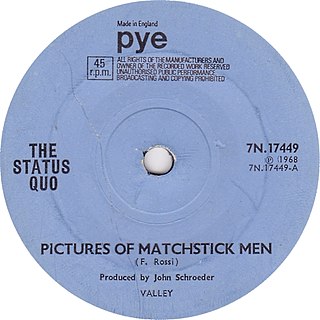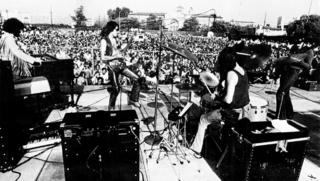
Steppenwolf was a Canadian-American rock band that was prominent from 1968 to 1972. The group was formed in late 1967 in Los Angeles by lead singer John Kay, keyboardist Goldy McJohn, and drummer Jerry Edmonton, all formerly of the Canadian band the Sparrows. Guitarist Michael Monarch and bass guitarist Rushton Moreve were recruited via notices placed in Los Angeles-area record and musical instrument stores.

"Born to Be Wild" is a song written by Mars Bonfire and first performed by the band Steppenwolf. It is often invoked in both popular and counter culture to denote a biker appearance or attitude. It is most notably featured in the 1969 film Easy Rider. Sometimes, "Born to Be Wild" is described as the first heavy metal song, and the second-verse lyric "heavy metal thunder" marks the first use of this term in rock music.

"Do You Believe in Magic" is a song by American rock band the Lovin' Spoonful, written by John Sebastian in 1965. The single peaked at number 9 on the Billboard Hot 100 chart. In 1978, Shaun Cassidy reached the Top 40 with his cover version.

Steppenwolf is the debut studio album by Canadian-American rock band Steppenwolf, released on January 29, 1968, on ABC Dunhill Records. It includes songs written by band members and songs written by others such as the Willie Dixon blues classic "Hoochie Coochie Man", retitled "Hootchie Kootchie Man".

The Second is the second studio album by Canadian-American rock band Steppenwolf, released in October 1968 on ABC Dunhill Records. The album contains one of Steppenwolf's most famous songs, "Magic Carpet Ride". The background of the original ABC LP cover was a shiny "foil", in contrast to later LP issues and the modern CD sleeve.

Steppenwolf Live is primarily a collection of recordings from a single concert early in 1970 at the Santa Monica Civic Auditorium by Steppenwolf staged in support of their 1969 album Monster. Released in April 1970 by Dunhill Records, it contains Steppenwolf's well-known hits: "Born to Be Wild", "Magic Carpet Ride" and "The Pusher", as well as most of the songs from Monster, including three previous top 40 hits, as well as the top 40 hit "Hey Lawdy Mama" from this album.

16 Greatest Hits is a compilation album by Steppenwolf, released in 1973. It features some of their most famous songs, including "Born to Be Wild", "The Pusher", and "Magic Carpet Ride", and "Hey Lawdy Mama." The album consisted of the 11 tracks from the previous Gold: Their Great Hits album, in the same order as on the two sides of that earlier album, with the addition of the final two tracks on side 1, and the final three tracks on side 2.

"Pictures of Matchstick Men" is the first hit single by British rock band The Status Quo. It was released on 5 January 1968.

"School's Out" is a song first recorded as the title track of Alice Cooper's fifth album. It was released as the album's only single on April 26, 1972. "School's Out" was Alice Cooper's biggest international hit and it has been regarded as their signature song and reached number seven on the Billboard Hot 100, number three in the Canadian RPM 100 Singles chart, number two on the Irish Singles Chart and number one on the UK Singles Chart.

"Green Tambourine" is a song written and composed by Paul Leka and Shelley Pinz. It was the biggest hit by the 1960s Ohio-based rock group the Lemon Pipers, as well as the title track of their debut album, Green Tambourine. The song was one of the first psychedelic pop chart-toppers and became a gold record.

"Magic" is a 1974 song by Scottish pop rock band Pilot, and was the first hit single for the group. It was written by band members David Paton and Billy Lyall for their debut album, From the Album of the Same Name.
Rushton Moreve was an American bass guitarist best known for his work with the rock band Steppenwolf from 1967 to 1968 and again in 1978. According to singer John Kay, he was an intuitive bassist with a melodic style that brought a non-commercial sound to the band, a technique exemplified on the hit he co-wrote with Kay, "Magic Carpet Ride".
"The Chain" is a song by British-American rock band Fleetwood Mac, released on their 1977 album Rumours. It is the only song from the album with writing credits for all five members.
The Sparrows was a Canadian blues rock band of the 1960s. Notable for being the first group to bring musician John Kay into the mainstream, the Sparrows later morphed into the popular heavy rock group Steppenwolf.

"Fly Like an Eagle" is a song written by American musician Steve Miller for the album of the same name. The song was released in the United Kingdom in August 1976 and in the United States in December 1976. It went to number two on the US Billboard Hot 100 for the week of March 12, 1977. The single edit can be found on Greatest Hits (1974–1978). It is often played in tandem with "Space Intro". On the album, the song segues into "Wild Mountain Honey".

Gold: Their Great Hits is a greatest hits album released by the Canadian-American hard rock band Steppenwolf. The album, released in 1971, charted at #24 on the Billboard Pop Albums charts and was certified "gold" by the RIAA on April 12, 1971. Initial pressings of the album came in a gatefold sleeve, with a detachable poster of the band.

The discography of Steppenwolf, a Canadian-American Hard rock band, consists of 13 studio albums, 14 compilation albums, 5 41 singles, and three music videos. The band was formed in 1967 after some members of The Sparrows split. Group members included John Kay, Michael Monarch, Goldy McJohn, Rushton Moreve and Jerry Edmonton. Their first album, Steppenwolf, was released in 1968, which sold well and reached 6 on Billboard. That same year, Steppenwolf covered "The Pusher". The song was later used in Easy Rider. The album's most successful single was "Born to Be Wild", which reached No. 2 on the Billboard. At the time of the release of second album, The Second, the band's bassist Rushton Moreve had a dispute with band leader John Kay, and was eventually replaced with Nick St. Nicholas. The album's single was "Magic Carpet Ride" which reached number 3 on Billboard.

"Rock On" is a song written by English singer David Essex. Recorded in 1973 and released as a single by Essex, it became an international hit. In 1989, American actor and singer Michael Damian recorded a cover version that went to number one on the Billboard Hot 100 chart. The song has been recorded many times, including a 2006 version by the English hard rock group Def Leppard.
"Peter Gunn" is the theme music composed by Henry Mancini for the television show of the same name. The song was the opening track on the original soundtrack album, The Music from Peter Gunn, released by RCA Victor in 1959. Mancini won an Emmy Award and two Grammys for Album of the Year and Best Arrangement. In 2005, the song was inducted into the Grammy Hall of Fame.
"Rock Me" is a song by the Canadian-American hard rock band Steppenwolf. It was released on their 1969 album At Your Birthday Party. It was written by the band's lead singer John Kay, and was the band's fifth American single release. The song was produced by Gabriel Mekler and released as a single in 1969, originally as the B-side to "Jupiter Child", but the sides were later flipped. It peaked at #10 on the Hot 100 on April 19, 1969 and #6 on both WLS and WCFL. It was both Billboard's and Cashbox's top debut the week of March 1, 1969. The song is considered the highlight of the album though it had been released for the soundtrack well ahead of the album. The song followed on the heels of the band's two 1968 hits, "Born to Be Wild" which peaked at #2 and "Magic Carpet Ride" which peaked at #3. Cash Box particularly praised the "pulverizing vocal performance."















